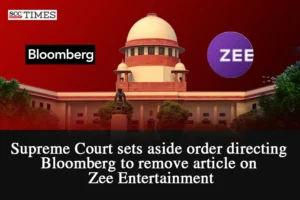Supreme Court: In a special leave to appeal against the decision of the Delhi High Court upholding the interim order of the ADJ, South Saket Courts directing the Bloomberg Television Production India Private Limited (‘Bloomberg’) to take down an article dated 21-02-2024 allegedly against the Zee Entertainment Enterprises Limited (‘Zee’), the three Judge Bench comprising of Dr. DY Chandrachud, CJI, JB Pardiwala and Manoj Misra, JJ. allowed the appeal and set aside the impugned orders.
Bloomberg was also restrained from posting, circulating or publishing the article in respect of Zee on any online or offline platform till the next date of hearing.
The Bench referred to the well-established three-fold test of establishing (i) a prima facie case, (ii) balance of convenience and (iii) irreparable loss or harm, for the grant of interim relief. The Court said that this test is equally applicable to the grant of interim injunctions in defamation suits. The Court reiterated that it must not be applied mechanically to the detriment of the other party and in the case of injunctions against journalistic pieces, often to the detriment of the public and while granting interim relief, the Court must provide detailed reasons and analyse how the three-fold test is satisfied.
The Court stated that in suits concerning defamation by media platforms and/or journalists, an additional consideration of balancing the fundamental right to free speech with the right to reputation and privacy must be borne in mind. The Court said that the constitutional mandate of protecting journalistic expression cannot be understated, and Courts must tread cautiously while granting pre-trial interim injunctions. The Court said that the ‘Bonnard standard’, laid down in Bonnard v. Perryman1 has acquired the status of a common law principle for the grant of interim injunctions in defamation suits, is to be followed.
Further, the Court said that the grant of a pre-trial injunction against the publication of an article may have severe ramifications on the right to freedom of speech of the author and the public’s right to know. The Court explained that an ex-parte injunction should not be granted without establishing that the content sought to be restricted is ‘malicious’ or ‘palpably false’. The Court stated that “granting interim injunctions, before the trial commences, in a cavalier manner results in the stifling of public debate”. Injunctions against the publication of material should be granted only after a full-fledged trial is conducted or in exceptional cases, after the respondent is given a chance to make their submissions.
The Bench also discussed the recognition of SLAPP suits which stands for ‘Strategic Litigation against Public Participation’ and is an umbrella term used to refer to litigation predominantly initiated by entities that wield immense economic power against members of the media or civil society, to prevent the public from knowing about or participating in important affairs in the public interest. The Court said that the grant of an interim injunction, before the trial, often acts as a ‘death sentence’ to the material sought to be published, well before the allegations have been proven. The Court also said that the Courts must be mindful that while granting ad-interim injunctions in defamation suits, the potential of using prolonged litigation to prevent free speech and public participation.
In the matter at hand, the Court said that the order of the Trial Court did not discuss, even cursorily, the prima facie strength of the Bloomberg’s case, nor does it deal with the balance of convenience or the irreparable hardship that is caused. The Court said that the Trial Court should have analysed that why such an ex parte injunction was essential, after setting out the factual basis and the contentions of the respondent made before the Judge.
The Court viewed that the High Court ought to have at least prima facie assessed whether the test for the grant of an injunction was duly established after an evaluation of facts. The Court said that merely recording that a prima facie case exists, that the balance of convenience is in favour of the grant of injunction and that an irreparable injury would be caused, would not amount to an application of mind to the facts of the case. The three-fold test cannot merely be recorded as a mantra without looking into the facts on the basis of which an injunction has been sought. Hence, the Court set aside both the orders of the Trial Court and the High Court. The Court directed that it would be open to Zee to renew their application for injunction, on which the Trial Court shall pass fresh orders after hearing the parties and bearing in mind the observations made in the present order.
[Bloomberg Television Production India Private Limited v. Zee Entertainment Enterprises Limited, 2024 SCC OnLine SC 426, Order dated: 22-03-2024]
Advocates who appeared in this case :
For appellant: Senior Advocate Mukul Rohatgi, Senior Advocate Neeraj Kishan Kaul, Senior Advocate
Dr. Menaka Guruswamy, Advocate Rohit Kochhar, Advocate Shiv Sapra, AOR Samiron Borkataky, Advocate Ranjeet Rohatgi, Advocate Rajat Gava, Advocate Ikshvaaku Marwah, Advocate Vishal Singh, Advocate Sanskriti Shrimali, Advocate Keshav Sehgal, Advocate Dhruv Sharma, Advocate Raghav Agarwal, Advocate Utkarsh Pratap, Advocate Lavish Bhambhani, Advocate Harshvardhan Thakur, Advocate Suvangana Agrawal
For the Respondent: Advocate Mahesh Agarwal, Advocate Madhavi Agarwal, Advocate Shashwat Singh, AOR E.C. Agrawal
1. 6 (1891) 95 All ER 965.

